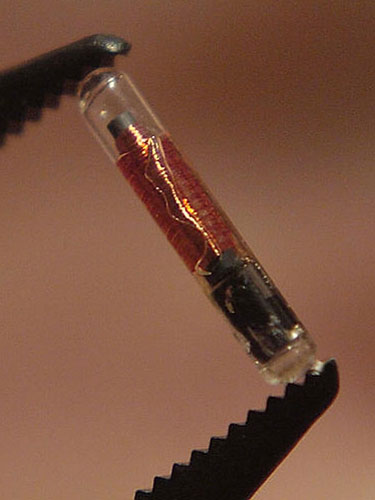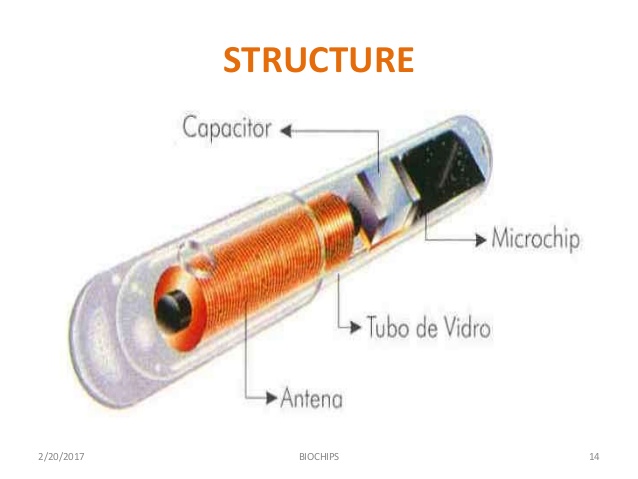میکروچیپ ایمپلنت یا (mind implant microchip) یک ردیابی الکترونیکی مخفی(دکترای نانو _ میکرو الکترونیک)
پژوهشگر و نویسنده: دکتر ( افشین رشید)
نکته : میکروچیپ ایمپلنت یک ریز تراشه الکترونیکی بسیار کوچک است که در بدن انسان یا حیوان کاشته میشود و انواع مختلفی دارد.در کل میکروچیپ ایمپلنت یا (mind implant microchip) یک ردیابی الکترونیکی مخفی ، غیر جراحی ، زیست سازگار بهبود یافته ارائه شده است که داخل یک محفظه قرار می گیرد.
محفظه حاوی میکرو مدار ها است. میکروچیپ ها به عنوان وسیله ای برای نجات زندگی موجودات زنده مورد استفاده قرار می گیرند. دستگاه های تنظیم کننده ضربان قلب میکروچیپ هایی را برای نگهداشتن زمان مورد استفاده قرار میدهند.میکروچیپ ایمپلنت یا (mind implant microchip) یک ردیابی الکترونیکی مخفی و تراشه های ریزی که در گوشت بین انگشت شست و انگشت اشاره کاشته می شوند ، مشابه آنچه در حیوانات خانگی نشان داده شده است. آنها به مردم امکان می دهند درب ورودی خود را باز کنند ، به مطب خود دسترسی پیدا کنند و یا با تکان دادن دست ماشین خود را روشن کنند و همچنین می توانند داده های بیولوژیکی را ذخیره کنند.
میکروچیپ ایمپلنت یا (mind implant microchip) وسیله ای بسیار کوچک به اندازه یک دانه برنج بوده که در داخل آن یک کد اختصاصی در مرحله ساخت طراحی شده است و به عنوان عامل شناسایی جاندران مورد استفاده قرار می گیرد و عاری از هر گونه منبع الکتریکی می باشد.میکروچیپ در زیر پوست جاندار کاشته می شود به طوری که این عمل کاشت نظیر واکسیناسیون بوده و بسیار ساده و بدون درد انجام می پذیرد. هر میکرو چیپ دارای یک کد اختصاصی بوده که در زمان ساخت توسط اشعه لیزر طراحی می گردد. این کد ها غیر قابل تغییر و یا جایگزینی بوده و در تمام مراحل حیات جاندار به عنوان عامل دقیق شناسایی استفاده می شود.میکرو چیپ در داخل محفظه شیشه ای که قابلیت تطابق با بافت زنده موجود را دارد ،قرار می گیرد. این محفظه از ایجاد واکنش های ایمنی جاندار جلوگیری می نماید.اجزاء میکرو چیپ قابلیت تعویض و یا جداشدگی ندارد و طوری طراحی شده است که تا انتهای عمر جاندارد بدون هیچ گونه عارضه ای در بدن باقی می ماند.
این میکرو چیپ ها به طور کلی به یک سیستم ردیابی و مکان یابی الکترونیکی و به طور خاص به یک سیستم پیشرفته مربوط می شود که یک مبدل درون آن قرار می گیرد. پیشرفته ترین سیستم ها امکان قرار گرفتن یک دارایی را تا چند پا را ممکن می کنند. اخیراً میکروچیپ هایی برای ردیابی و یافتن افراد توسعه داده شده است. این وسایل ردیابی و مکان یابی برای مدیریت افرادی ،مانند افرادی که مبتلا به آلزایمر هستند ، زندانیان ، کودکان و افراد نظامی. سیستم های دیگری برای ردیابی حیوانات اهلی و حیوانات دیگر پیشنهاد شده است. فرستنده ها و گیرنده های مورد استفاده در مکان یابی و ردیابی انسان ها به عنوان دستبند ، دوخته شده به لباس ، قرار دادن در کوله پشتی ، کاشت در پشت گوش انسان و به طور کلی زیر پوست کاشته شده اند. یکی از این سیستم ها از فناوری ماهواره ای موقعیت یابی جهانی برای ردیابی و یافتن اشیاء بی جان ، حیوانات و انسان ها استفاده می کند. به این شکل که ، یک دستبند حاوی گیرنده توسط کودک پوشیده می شود. با استفاده از موقعیت مکانی شناخته شده توسط سه ماهواره در مدار و زمان لازم برای عبور سیگنال بین مبدل و هر کدام از سه ماهواره ، می توان موقعیت سه بعدی مبدل را محاسبه کرد.
پژوهشگر و نویسنده: دکتر ( افشین رشید)
دکترایِ تخصصی نانو _ میکرو الکترونیک




